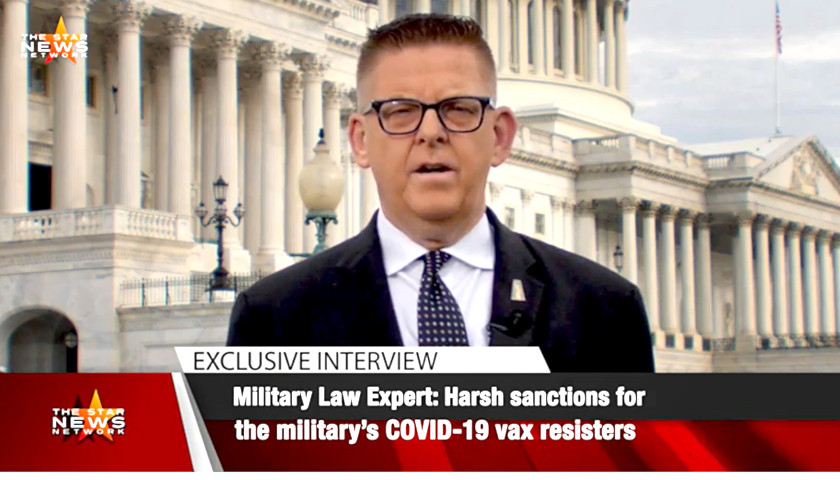Neil W. McCabe, the national political editor of The Star News Network, interviewed Dwight Stirling, the CEO of The Center for Law and Military Policy, about the process of discharging unvaccinated servicemembers now that all deadlines for President Joseph R. Biden Jr.’s military COVID-19 vaccine mandate have passed.
Stirling, a serving judge advocate general (JAG) officer in the California Army National Guard, said while there is no chance of a servicemember receiving a dishonorable discharge if being unvaccinated is his only offense, there are other sanctions, such as discharge categories, that take away benefits like the GI Bill and VA home loans.
TRANSCRIPT:
McCabe: Now that all the deadlines have passed and President Joe Biden’s military COVID-19 vaccine mandate, the Pentagon’s machinery for kicking out unvaccinated servicemen and women, is hitting high gear.
Attorney Dwight Stirling, the CEO of the Garden Grove, California-based Center for Law and Military Policy, told The Star News Network how that machinery works.
Stirling: That’s a huge number of personnel who don’t have an exemption and now are faced with the prospect of a discharge. Just from the admin side of the house, the reinforcement side of the house and the processing of the thousands is going to be a challenge.
McCabe: Beyond the impact on readiness, there is also the impact on the administrative and legal staffs tasked with processing soldier counseling and exemption requests and then all of the paperwork and preparation associated with the separation boards themselves.
Stirling: The conducting of the board for all the unvaccinated would be a huge burden on the military. But not every member of the military is entitled to a board. It’s only those who are senior in rank, other officers, or the enlisted of a certain rank who are entitled to that board who are given that right.
McCabe: The former infantry officer said there is no way an unvaccinated service member would receive a dishonorable discharge if that was his only offense.
Stirling: A dishonorable discharge at the end of a court martial and of a general court trial is akin to a trial on the felony level.
McCabe: A discharge under less than honorable conditions comes with its own sanctions.
Stirling: But at most, it will disqualify a soldier or servicemember from the GI bill and from some of the VA benefits, like the home loan, et cetera.
McCabe: Stirling, who also serves as a JAG officer in the California Army National Guard, said he is concerned about senior officers getting their exemptions while junior soldiers face involuntary discharge and exemption denials.
Stirling: I have questions as to doling out exemptions. How do we give them in a fair manner?
McCabe: Reporting for The Star News Network, Neil W. McCabe, Washington.









If we are ever able to throw these Marxists out again the next president should reinstate all service members who were purged. Then toss out the alphabet people and the woke officers.